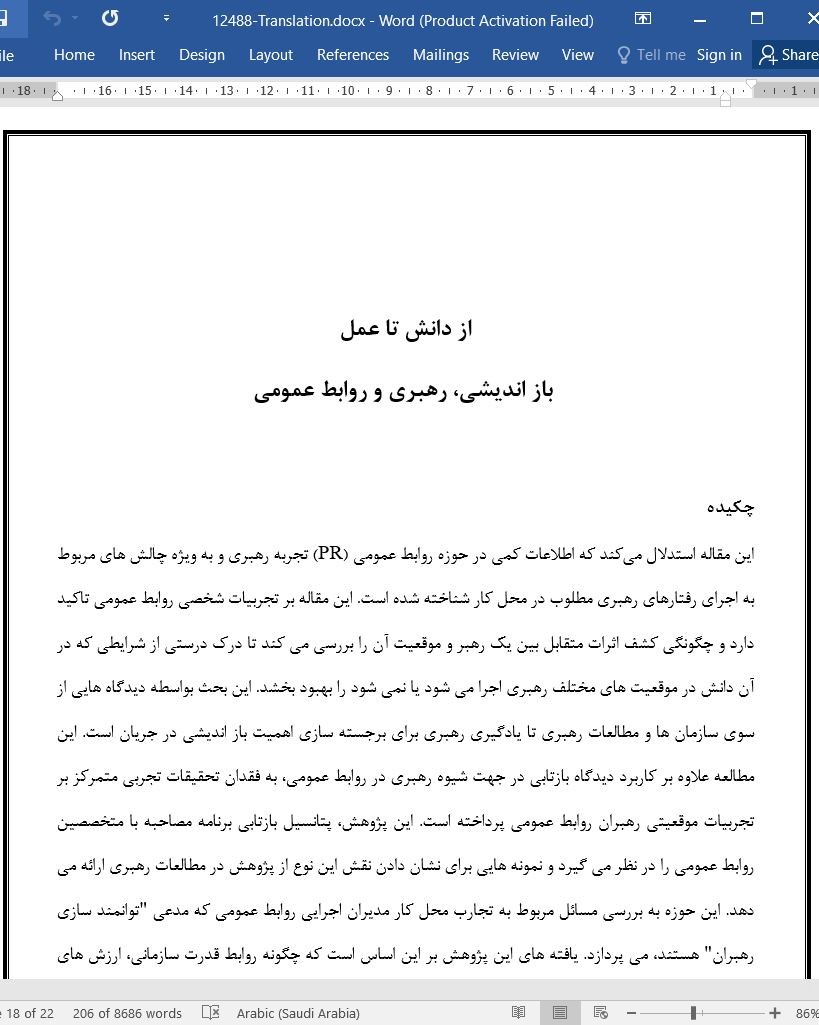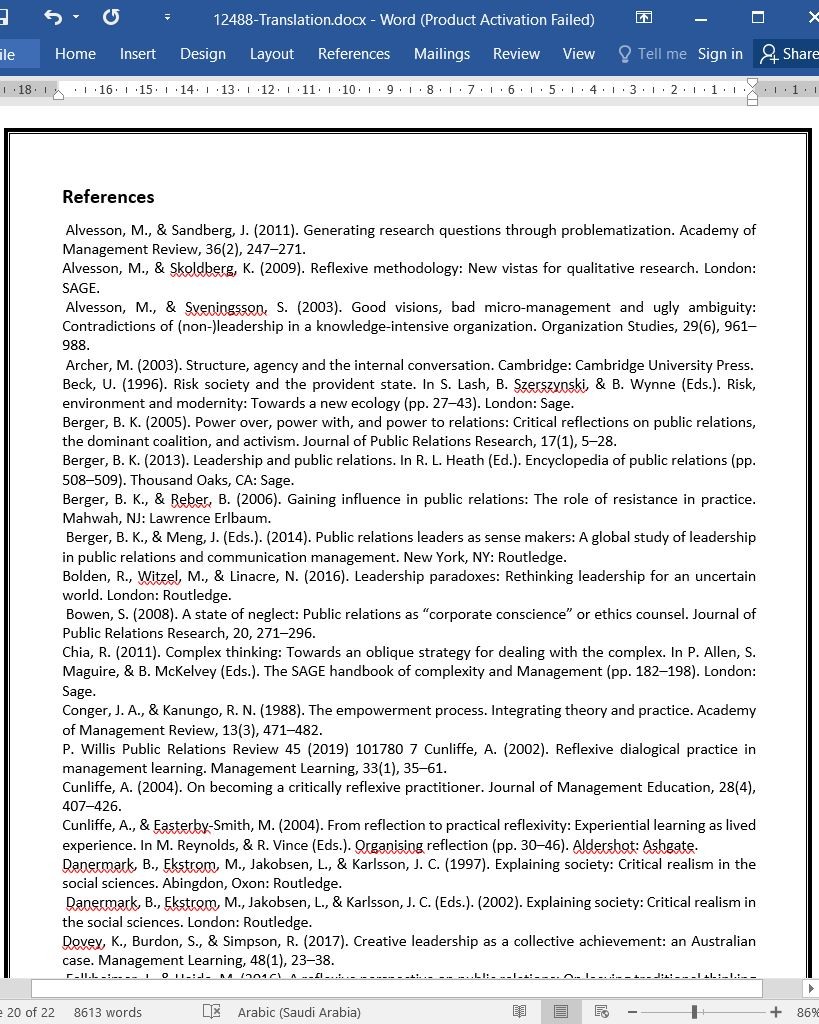
دانلود مقاله از دانش تا عمل: باز اندیشی، رهبری و روابط عمومی
چکیده
این مقاله استدلال می کند که اطلاعات کمی در حوزه روابط عمومی (PR) تجربه رهبری و به ویژه چالش های مربوط به اجرای رفتارهای رهبری مطلوب در محل کار شناخته شده است. این مقاله بر تجربیات شخصی روابط عمومی تاکید دارد و چگونگی کشف اثرات متقابل بین یک رهبر و موقعیت آن را بررسی می کند تا درک درستی از شرایطی که در آن دانش در موقعیت های مختلف رهبری اجرا می شود یا نمی شود را بهبود بخشد. این بحث بواسطه دیدگاه هایی از سوی سازمان ها و مطالعات رهبری تا یادگیری رهبری برای برجسته سازی اهمیت باز اندیشی در جریان است. این مطالعه علاوه بر کاربرد دیدگاه بازتابی در جهت شیوه رهبری در روابط عمومی، به فقدان تحقیقات تجربی متمرکز بر تجربیات موقعیتی رهبران روابط عمومی پرداخته است. این پژوهش، پتانسیل بازتابی برنامه مصاحبه با متخصصین روابط عمومی را در نظر می گیرد و نمونه هایی برای نشان دادن نقش این نوع از پژوهش در مطالعات رهبری ارائه می دهد. این حوزه به بررسی مسائل مربوط به تجارب محل کار مدیران اجرایی روابط عمومی که مدعی "توانمند سازی رهبران" هستند، می پردازد. یافته های این پژوهش بر این اساس است که چگونه روابط قدرت سازمانی، ارزش های رهبری حمایتی متخصصان را تحریف می کند و به گونه ای در طراحی فرآیند مسئله سازی دخیل است که ارتقا غیرانتقادی (پیشرفت عادی) رویکردهای هنجاری و بافت زدوده ( decontextualized) به رهبری را به چالش می کشد. این مقاله فواید گرایش بازتابی (انعکاسی) به تحقیق و آموزش رهبری روابط عمومی را نشان می دهد، در حالی که خواستار ارتقا شکل خاصی از هوش زمینه ای برای کمک به متخصصین در مقابله با شرایط سازمانی است که به طور خاص بر توانایی آن ها برای هدایت دیگران تاثیر می گذارد.
1. مقدمه
بیش از 30 سال پیش در این مجله، تایر (1986) در مقاله ای درمورد رهبری، از یک ضرب المثل اسپانیایی برای اشاره به این نکته استفاده می کند که بحث یا مطالعه ای درمورد رهبری یا همانند آن انجام نشده است. ضرب المثلی که او بکار می برد به طور نمایشی هشدار می دهد که از حرف تا عمل فاصله بسیار است. چهار دهه از اظهارات تایر درمورد صحنه گاو بازی می گذرد، اما هنوز اطلاعات کمی در روابط عمومی (PR) درمورد تجارب متخصصین در رهبری دیگران، و به طور خاص چالش های مرتبط با اجرای رفتارهای رهبری مطلوب در محل کار داریم. این عدم توجه برای مدتی که یک صعود ناگهانی اخیر در تحقیقات رخ داده است، تعجب برانگیز نیست، به رغم اهمیت آن به تاثیر، توسعه و شهرت این حرفه، رهبری در روابط عمومی همچنان در یک حوزه تحقیقاتی در حال توسعه باقی مانده است. گرایش این مقاله به تجربیات شخصی متخصصان درصدد اجرای رفتارهای رهبری مطلوب است، به علاوه مشارکت در حوزه نوظهور تحقیقات روابط عمومی، با اتصال PR به تحقیقات مربوطه خارج از حوزه دانش پیشرفت بیشتری می کند.
10. خلاصه
این مقاله بر اهمیت ارتباط تحقیق رهبری PR با موضوعات پیرامون این زمینه تاکید می کند. بی توجهی به زمینه وسیعتر رهبری می تواند منجر به ترویج "بهترین روش" رهبری شود، به جای اینکه تشخیص دهند که رهبران روابط عمومی نقاط شروع متفاوتی دارند و در زمینه های مختلف فعالیت می کنند (Schyns et al., 2013). با ترغیب رویکردهای بازتابی در پژوهش، آموزش و شیوه به عنوان روشی مورد تاکید قرار می گیرد، که در آن، حوزه روابط عمومی فرآیند تعامل زمینه ای را آغاز کند. این مطالعه از طریق بحث یافته های تجربی خود دو اولویت را نشان می دهد. اول، تمرکز بازتابی بیشتر در تحقیقات PR در مورد شرایط موثر بر رفتار رهبری و عواقب آن برای متخصصین است. از این مفهوم می توان برای حمایت از اولویت دوم، یعنی تقویت شکلی از هوش زمینه ای در بین متخصصین روابط عمومی استفاده کرد که می تواند به آنها کمک کند تا فرهنگ ، ساختارها و فرآیندهای موجود در سازمان را بهتر درک کنند، که به طور خاص بر نحوه انجام کارشان تأثیر می گذارد. رهبران روابط عمومی با استفاده از این درک می توانند رفتارها و استراتژی هایی را که باید اجرا کنند را در نظر بگیرند تا کارها را انجام دهند.
Abstract
This article argues that little is known in public relations (PR) about the experience of leadership and, more specifically, the challenges associated with enacting desired leadership behaviours in the work place. The study focusses on the personal experiences of PR leaders and considers how exploring the interplay between a leader and their context enhances understanding of the conditions under which knowledge is enacted, or rather not enacted, in different leadership situations. The discussion is informed by perspectives from organization and leadership studies which highlight the importance of reflexivity to leadership learning. In addition to applying a reflexive lens to leadership practice in public relations, the study addresses a lack of empirical research focussing on the situated experiences of PR leaders. It considers the reflexive potential of a programme of interviews with PR practitioners providing examples to illustrate the role this form of research can play in leadership studies. The context investigated concerns the work place experiences of senior PR executives who claim to be ‘empowering leaders’. The discussion of the findings focuses on how organizational power relations distort the practitioners’ espoused leadership values and engages in a process of problematization designed to challenge the uncritical promotion of normative and decontextualised approaches to leadership. The article highlights the benefits of a reflexive orientation to PR leadership research and pedagogy, while calling for the promotion of a particular form of contextual intelligence to help practitioners confront the organizational conditions which specifically impact on their ability to lead others.
1. Introduction
In an article about leadership in this journal more than 30 years ago, Thayer (1986) appropriated a Spanish proverb to make the point that discussing or reading about leadership is not the same as doing it. The proverb he uses warns theatrically that to talk of bulls is not the same as being in the bullring. Four decades on from Thayer’s evocation of the bullring we still know little in public relations (PR) about the experiences practitioners have of leading others and, more specifically, the challenges associated with enacting desired leadership behaviours in the work place. This oversight is not surprising for while there has been a recent upsurge in research, leadership in PR remains an under-developed area of inquiry despite its importance to the impact, development and reputation of the profession (Berger, 2013; McKie & Willis, 2015; Meng, 2014; Petersone & Erzikova, 2016). This article’s interest in the personal experiences of practitioners seeking to enact desired leadership behaviours, in addition to contributing to a nascent area of public relations scholarship, further advances knowledge by connecting PR to relevant research from outside of the field.
10. Summary
This article highlights the importance of connecting PR leadership research with issues around context. Disregarding the wider context of leadership can result in the promotion of a ‘one-best-way’ of leading, rather than recognising that PR leaders have different starting points and operate in different contexts (Schyns et al., 2013). Encouraging reflexive approaches in research, pedagogy and practice is highlighted as one way in which the PR field can initiate a process of contextual engagement. Through the discussion of its empirical findings the study suggests two priorities. First, a greater reflexive focus in PR research on the conditions affecting leadership behaviour and the consequences these have for practitioners. This understanding can then be used to support the second priority which is to foster a form of contextual intelligence amongst PR practitioners which can help them to better appreciate the culture, structures and processes in the organization which specifically impact on how they do their job. Drawing on this understanding, PR leaders can then consider the behaviours and strategies they should enact in order to get things done.
چکیده
1. مقدمه
2. باز اندیشی و ارتباط با زمینه
3. بررسی تجربیات زندگی رهبران روابط عمومی
4. طرح تحقیقی مطالعه
5. ظهور تضاد ها و تناقضات
6. موضوع توان زدایی و فرهنگ
7. مفاهیم تئوری و عملی
8. از روش شناسی تا آموزش
9. محدودیت های مطالعه
10. خلاصه
منابع
Abstract
1. Introduction
2. Reflexivity and connecting with context
3. Exploring the lived experiences of PR leaders
4. The study’s research design
5. Emerging conflicts and contradictions
6. Disempowering narratives and cultures
7. Implications for theory and practice
8. From methodology to pedagogy
9. The study’s limitations
10. Summary
References
- اصل مقاله انگلیسی با فرمت ورد (word) با قابلیت ویرایش
- ترجمه فارسی مقاله با فرمت ورد (word) با قابلیت ویرایش، بدون آرم سایت ای ترجمه
- ترجمه فارسی مقاله با فرمت pdf، بدون آرم سایت ای ترجمه


